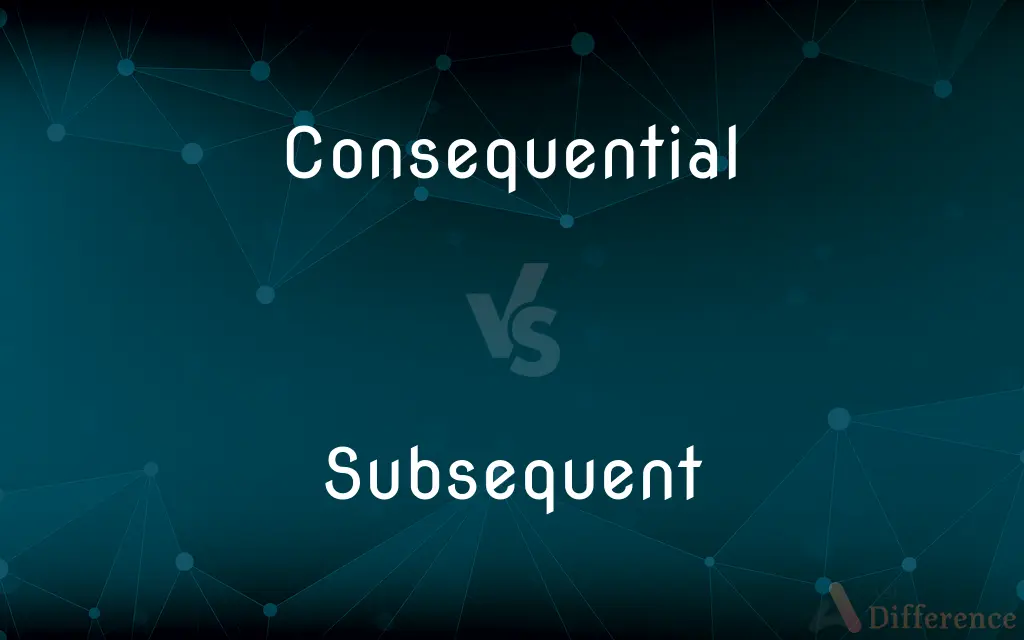Consequential vs. Subsequent — What's the Difference?
By Tayyaba Rehman — Updated on September 26, 2023
"Consequential" refers to something having significant consequences or importance, while "subsequent" simply means occurring or coming later in time.

Difference Between Consequential and Subsequent
Table of Contents
ADVERTISEMENT
Key Differences
The terms “consequential” and “subsequent” represent distinct concepts within the English language. “Consequential” refers to things that have significant consequences, implications, or importance. It implies a level of impact or result that is meaningful or considerable, often used in contexts where actions, decisions, or events lead to noteworthy outcomes. On the other hand, “subsequent” is a term used to describe something that follows in time, order, or place. It does not inherently carry a sense of importance or significance but simply denotes a sequential occurrence, highlighting the chronological order of events without implying any consequential impact.
Understanding the difference between “consequential” and “subsequent” is crucial for accurate communication. Using “consequential” implies a significant level of impact or importance, which might not be the intended message if something is merely following another in time without having notable implications. Conversely, using “subsequent” properly conveys the idea of a succeeding event or action without imparting any inherent significance or impact to it. Misusing these terms can lead to misunderstandings and misinterpretations, potentially conveying incorrect information about the importance or chronological nature of the subjects being discussed.
In a legal or formal context, using “consequential” and “subsequent” appropriately is essential. “Consequential” could be used to emphasize the significant implications or outcomes of a law, decision, or action, stressing the meaningful impact it has. In contrast, “subsequent” would be used to denote anything that follows, such as subsequent clauses or subsequent events, without any inherent emphasis on their importance or impact. Recognizing the appropriate contexts for these terms ensures precise and clear communication, particularly in settings where the accurate conveyance of information is paramount.
In literature and academic writing, the distinction between “consequential” and “subsequent” plays a significant role. “Consequential” can be used to express the importance or significant impact of actions, decisions, or events within a narrative or argument, enhancing the perceived weight or relevance of the subject. “Subsequent” is useful for describing the order of events or ideas, maintaining clarity in the flow of the narrative or argument without imposing any intrinsic value or importance to what is being described. The careful and appropriate use of these terms enriches the clarity and depth of expression in written works.
Comparison Chart
Meaning
Having significant consequences or importance
Occurring or coming later in time
ADVERTISEMENT
Implication
Implies significance and impact
Implies chronological order
Usage
To emphasize the importance or impact of something
To denote the order of occurrence
Context
Legal, formal, literature
Anywhere where order is discussed
Inherent Value
Carries a sense of importance
Does not impart inherent significance
Compare with Definitions
Consequential
Having significant consequences.
The consequential decision affected the company’s future.
Subsequent
Coming after something in time.
The subsequent development of the project was rapid and efficient.
Consequential
Synonymous with meaningful or significant.
The consequential event marked a turning point in history.
Subsequent
Following in time or order.
Subsequent events proved the theory correct.
Consequential
Indicative of having considerable implications.
The consequential error led to a serious misjudgment.
Subsequent
Next in sequence.
The author discusses this in a subsequent chapter.
Consequential
Implying importance or value.
His consequential contribution to science earned him a Nobel Prize.
Subsequent
Occurring or coming later or after.
Subsequent to the meeting, they adjusted the plan.
Consequential
Leading to substantial effects or results.
The research had a consequential impact on the field.
Subsequent
Succeeding or future.
He was unaware of the subsequent consequences of his action.
Consequential
Following as an effect, result, or conclusion; consequent.
Subsequent
Following in time or order; succeeding.
Consequential
Having important consequences; significant
"The year's only really consequential legislation was the reform of Social Security" (New York Times).
Subsequent
Following in time; coming or being after something else at any time, indefinitely.
Growth was dampened by a softening of the global economy in 2001, but picked up in the subsequent years due to strong growth in China.
Consequential
Important; influential
A consequential figure in the academic community.
Subsequent
Following in order of place; succeeding.
Consequential
Pompous; self-important
"He's a proud, haughty, consequential, turned-up-nosed peacock" (Charles Dickens).
Subsequent
Following a line in the earth that is more easily eroded.
Consequential
Following as a result.
Subsequent
(geology) A subsequent stream or faultline.
Consequential
Having significant consequences; of importance.
Subsequent
Following in time; coming or being after something else at any time, indefinitely; as, subsequent events; subsequent ages or years; a period long subsequent to the foundation of Rome.
Consequential
Important or significant.
Subsequent
Following in order of place; succeeding; as, a subsequent clause in a treaty.
Consequential
(of a person) Self-important.
Subsequent
Following in time or order;
Subsequent developments
Consequential
Following as a consequence, result, or logical inference; consequent.
All that is revealed in Scripture has a consequential necessity of being believed . . . because it is of divine authority.
These kind of arguments . . . are highly consequential and concludent to my purpose.
Consequential
Having important issues or results;
The year's only really consequential legislation
An eventful decision
Common Curiosities
What does consequential mean?
Consequential refers to something having significant consequences, implications, or importance.
In what contexts is consequential commonly used?
Consequential is commonly used in legal, formal, and literary contexts to emphasize significance or impact.
What is meant by subsequent?
Subsequent means occurring or coming later in time, order, or place.
Does consequential always imply a positive impact?
No, consequential can imply either positive or negative impacts, but it always signifies something important or significant.
Can consequential be used to emphasize importance?
Yes, consequential is often used to emphasize the importance or significant impact of something.
Can the misuse of consequential and subsequent lead to misunderstandings?
Yes, misusing consequential and subsequent can lead to misunderstandings as they convey different aspects – one of importance and the other of order.
Can subsequent refer to something that comes after something else in a sequence?
Yes, subsequent specifically refers to something coming after something else in time, order, or sequence.
Does subsequent imply any inherent significance or impact?
No, subsequent does not imply any inherent significance or impact; it simply denotes chronological order.
Is subsequent typically used to denote chronological order?
Yes, subsequent is typically used to denote the chronological order of events, occurrences, or items.
Share Your Discovery

Previous Comparison
Addiction vs. Habit
Next Comparison
Confrontation vs. CollaborativeAuthor Spotlight
Written by
Tayyaba RehmanTayyaba Rehman is a distinguished writer, currently serving as a primary contributor to askdifference.com. As a researcher in semantics and etymology, Tayyaba's passion for the complexity of languages and their distinctions has found a perfect home on the platform. Tayyaba delves into the intricacies of language, distinguishing between commonly confused words and phrases, thereby providing clarity for readers worldwide.
















































